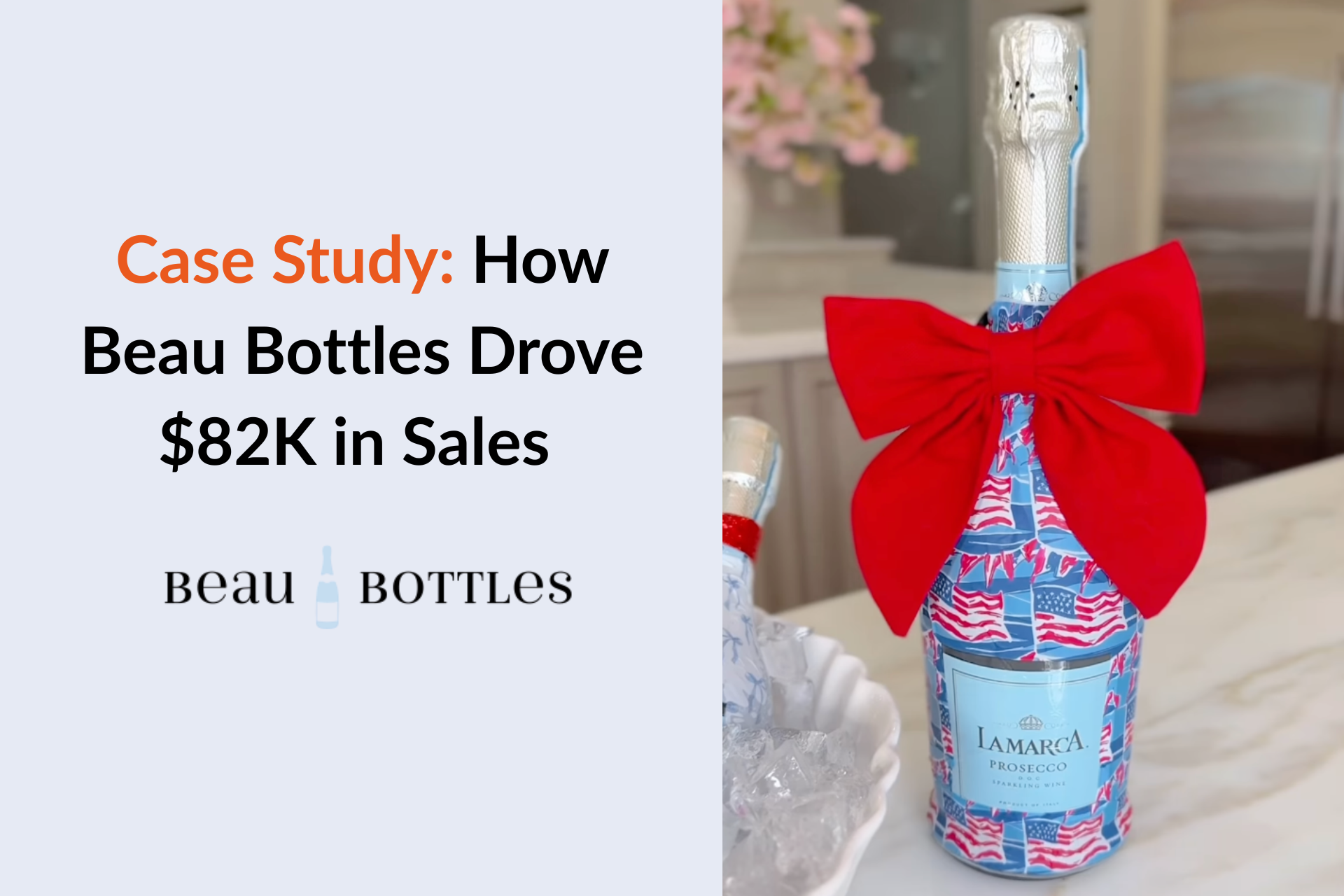





Social Book is a popular influencer marketing platform known for its ability to help brands find and manage influencers, but it comes with its share of drawbacks. Users have highlighted key issues such as limited customer support, an interface that can be difficult to navigate, and a lack of advanced analytics features compared to other tools.
With the influencer marketing space growing rapidly, it's essential to find the right platform that offers both scalability and precision. In this article, we’ll explore the top 10 Social Book alternatives, diving into their features, pricing, and key advantages.
Let’s explore three key reasons why some users might be seeking Social Book alternatives:
Users frequently report that Social Book’s interface is clunky and difficult to navigate, with many encountering bugs and glitches. While some issues are resolved after reporting, the platform’s inconsistency in performance remains a major concern for businesses.
Social Book’s data evaluation, especially for Instagram, is often criticized for being inaccurate. Users have noted discrepancies between Social Book and other tools like VidiQ, with the platform's Instagram analytics falling short compared to free, more reliable options directly from Instagram.
Users found technical issues in Social Book’s interface, including error messages and problems with report generation. Users have also faced long outages with the Chrome plugin, making the platform unreliable for those needing a seamless experience.
Our comparison focuses on several key aspects:
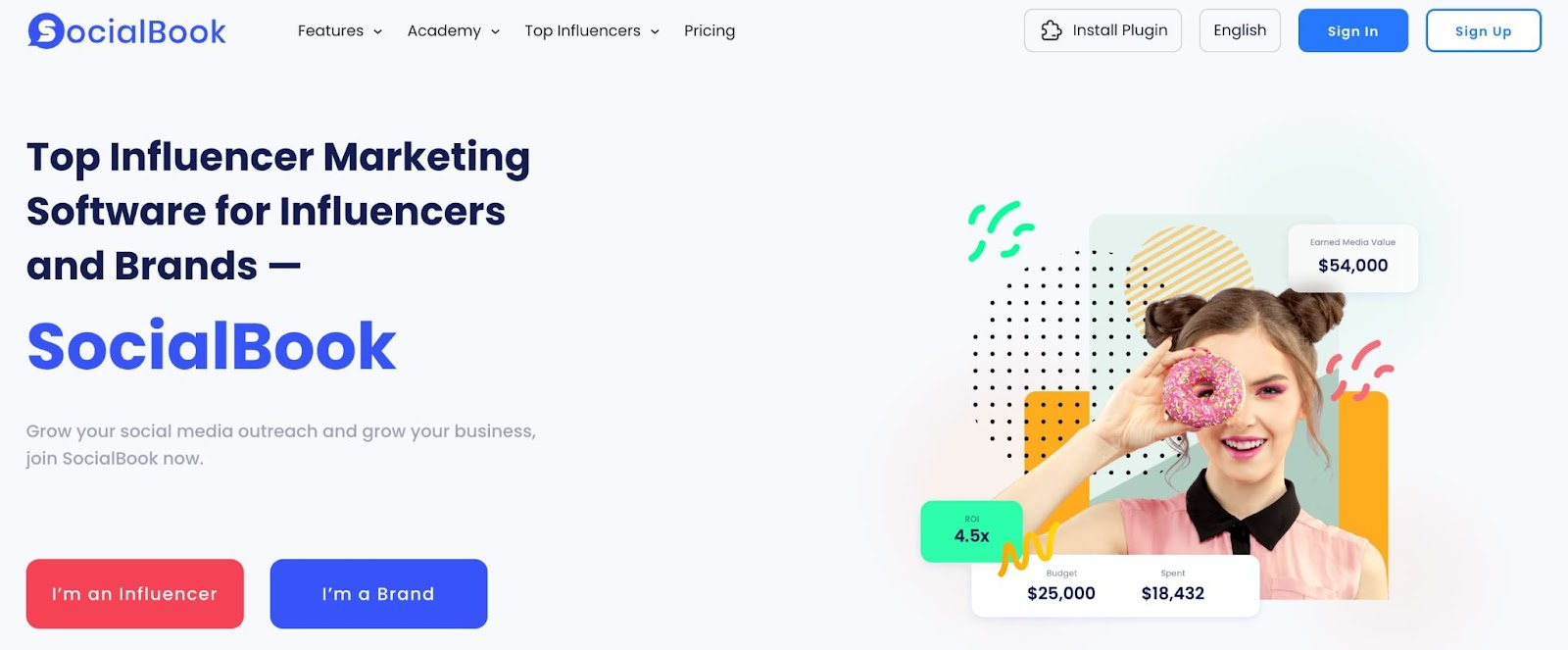
Platform Coverage: Supports major influencer and creator platforms including Instagram, YouTube, and Twitch.
Best For: SocialBook is best for brands, agencies, or e-commerce businesses looking to scale influencer and affiliate programs with data-driven selection and automation.
Pricing:
Reviews: 3.7 / 5.0 (Capterra)
Ease of Use (UX/UI): Many users praise SocialBook’s intuitive search and onboarding, noting you can begin exploring influencers quickly. However, some reviews flag occasional UX friction, such as unclear navigation, lack of a “clear all filters” button, and glitches in interface responsiveness.
Customer Support: Users frequently commend SocialBook’s support team as attentive, responsive, and willing to address issues.That said, some feedback mentions delays in seeing substantive changes or feature fixes after requests.

Platform Coverage: Instagram, TikTok, YouTube, Facebook, Pinterest, Snapchat, X, Twitch
Best For: Influencer Hero is best for D2C brands, eCommerce businesses, and agencies that want an all-in-one influencer marketing platform with strong CRM automation, multi-platform support, and AI-powered campaign optimization to drive ROI at scale.
Pricing: (Plans are monthly and scalable.)
Reviews: 5.0 / 5.0 (Capterra)
Ease of Use (UX/UI): Influencer Hero is known for its intuitive and streamlined dashboard, drag-and-drop campaign setup, and automated workflows. Users highlight how customizable email templates and a clean interface save them hours each week, even when running large-scale campaigns.
Customer Support: One of Influencer Hero’s biggest strengths is its premium customer support. Every plan includes a dedicated account manager from day one, plus 24/7 real-human live chat, responsive email support, and an extensive Help Center with tutorials. Pro plan users also gain exclusive access to a private Slack channel for direct, ongoing communication and strategy guidance.
While both Social Book and Influencer Hero offer strong influencer discovery and campaign management tools, Influencer Hero stands out with its broader platform coverage, deeper CRM capabilities, and more advanced eCommerce integrations. Social Book covers Instagram, YouTube, and Twitch, whereas Influencer Hero supports Instagram, TikTok, YouTube, Facebook, Pinterest, Snapchat, X, and Twitch, making it better suited for brands seeking a multi-channel strategy.
Pricing also highlights a key difference: Social Book’s entry plan starts at $199/month, while Influencer Hero begins at $649/month, but delivers enterprise-grade features like dedicated account managers, AI-powered workflows, and seamless integrations that Social Book lacks. For brands and agencies looking for reliability, scalability, and premium support, Influencer Hero positions itself as a long-term growth partner, not just a tool.
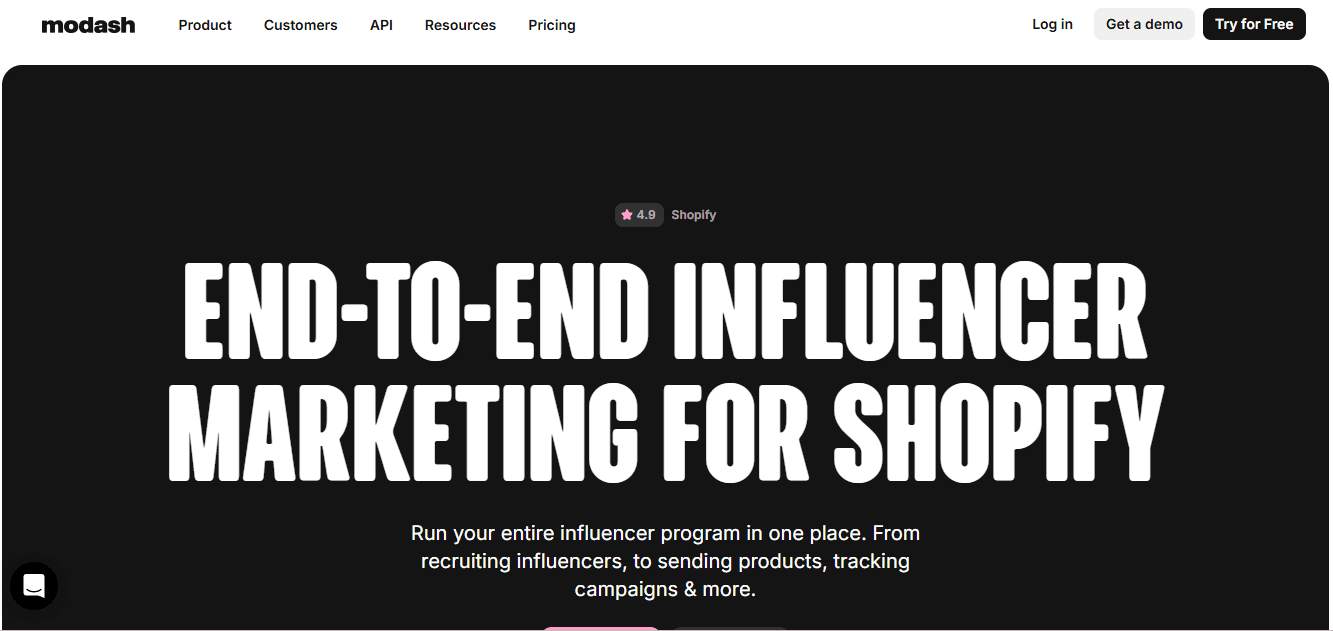
Platform Coverage: Instagram, TikTok, YouTube, and profile recognition for X, Snapchat, and other platforms.
Best For: Modash is best for brands and agencies focused on discovery and affiliate-driven campaigns, especially eCommerce businesses on Shopify that want reliable tracking, automated gifting, and streamlined influencer payouts.
Pricing: Modash offers free trials to both their Essentials and Performance plan.
Reviews: 4.9 / 5.0(Capterra.com)
Ease of Use (UX/UI): Modash is praised for its streamlined workflow from discovery to campaign management to payouts, making it simple for teams to move fast without unnecessary complexity. Users note that its filters and search tools are easy to navigate, even when working across large creator databases.
Customer Support: Users highlight excellent onboarding and responsive support from the Modash team, with clear guidance on setting up campaigns and troubleshooting. The platform’s support is seen as reliable and proactive, though it does not offer the same 24/7 dedicated account manager model as higher-end tools.
Discover our guide on the 10 best Modash alternatives for effective influencer marketing, complete with pricing and reviews.
Social Book provides a broader toolset including campaign management, content creation tools, and support for Instagram, YouTube, and Twitch. Modash, meanwhile, specializes in influencer discovery, Shopify-integrated gifting, affiliate tracking, and streamlined payouts, making it a stronger choice for eCommerce teams seeking depth in these areas.
When it comes to pricing, both start at $199/month, but Modash offers access to a far larger creator database (350M+ profiles vs Social Book’s smaller dataset) and more advanced AI-powered discovery.
Social Book appeals to brands seeking an all-in-one suite with design and content tools, while Modash positions itself as a best-in-class discovery and affiliate automation solution with unmatched scale and reliability.
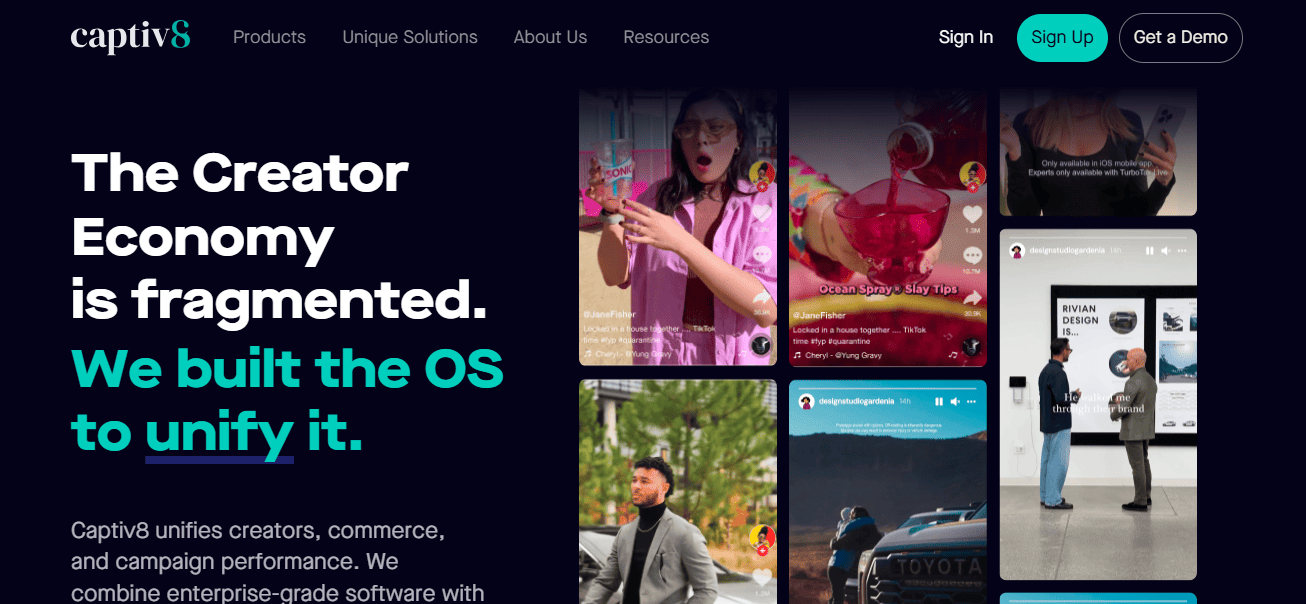
Platform Coverage: Captiv8 supports influencer campaigns across Instagram, YouTube, TikTok, Facebook, Twitter, and Pinterest.
Best For: Captiv8 is best for large brands and agencies managing multi-market influencer campaigns, particularly those seeking advanced analytics, audience insights, and the ability to activate creators across multiple regions and verticals.
Pricing:
No monthly or customizable plans are available; pricing is rigid and enterprise-focused
Reviews: 4.6 / 5.0 (G2)
Ease of Use (UX/UI): Captiv8 provides a sophisticated dashboard with extensive customization options. While powerful, it may feel complex at first for new users, but teams handling large-scale influencer programs value the depth of analytics and campaign visibility.
Customer Support: Captiv8 offers account management, onboarding support, and in-depth training sessions. Some users highlight the responsiveness of their account managers, while others note that support can vary depending on contract tier and brand size.
Social Book and Captiv8 differ significantly in scale and pricing.
Social Book, starting at $199/month, is designed for small to mid-sized brands needing affordable discovery and campaign tools. Captiv8, on the other hand, is built for enterprise clients, offering advanced analytics, audience safety checks, paid amplification, and cross-platform reach across more than seven social channels.
While Social Book is easier to access and budget-friendly, Captiv8 is more suitable for global brands running multi-market campaigns at scale. It provides enterprise-grade analytics, custom integrations, and compliance features that go far beyond Social Book’s capabilities—but at a much higher cost.
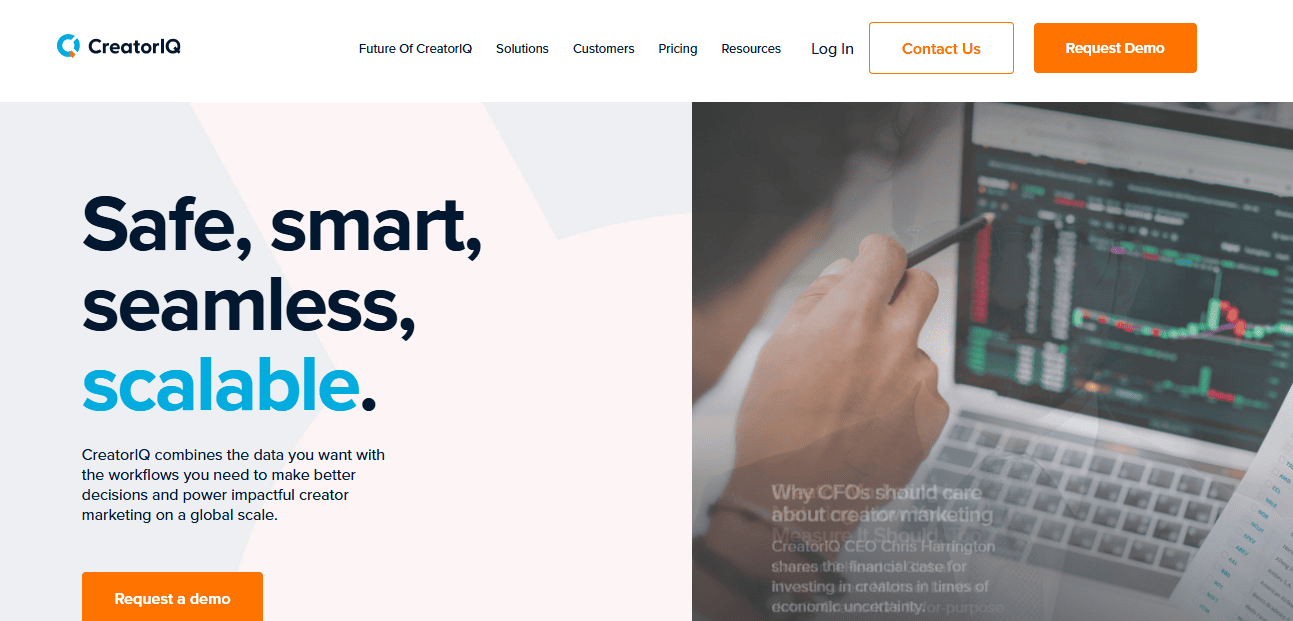
Platform Coverage: Instagram, TikTok, YouTube, Facebook, Pinterest, Twitch, X.
Best For: CreatorIQ is best for enterprise-level brands and global agencies that need a scalable, end-to-end influencer marketing solution with advanced reporting, compliance features, and direct integrations with major social platforms.
Pricing:
Reviews: 4.6 / 5.0 (G2)
Ease of Use (UX/UI): CreatorIQ’s platform is comprehensive and highly customizable, but it is designed with large teams in mind. While the dashboards and workflows are polished and professional, new users may require onboarding to take full advantage of its extensive feature set.
Customer Support: CreatorIQ includes a dedicated implementation manager and customer success team for all clients, offering onboarding, quarterly planning, and strategic support. This level of hands-on partnership goes beyond standard software support, aligning with its enterprise positioning.
Discover our top 10 CreatorIQ alternatives to elevate your influencer marketing strategy with more intuitive tools, flexible pricing, and scalable performance.
Social Book is a budget-friendly solution starting at $199/month, appealing to small and mid-sized brands that need influencer discovery, campaign management, and content tools without long-term commitments. CreatorIQ, by contrast, is built for enterprises, with annual contracts starting at $35,000/year and extending to $200,000/year depending on scale.
While Social Book provides accessible entry-level influencer tools, CreatorIQ offers unmatched scalability, compliance, and integrations. Its direct API partnerships with Meta, TikTok, and YouTube ensure accurate real-time data, and its reporting and UGC rights management features make it a go-to platform for global corporations. The trade-off is cost and flexibility: Social Book is easier to start with, but CreatorIQ delivers enterprise-grade reliability and strategic partnership for brands operating at global scale.
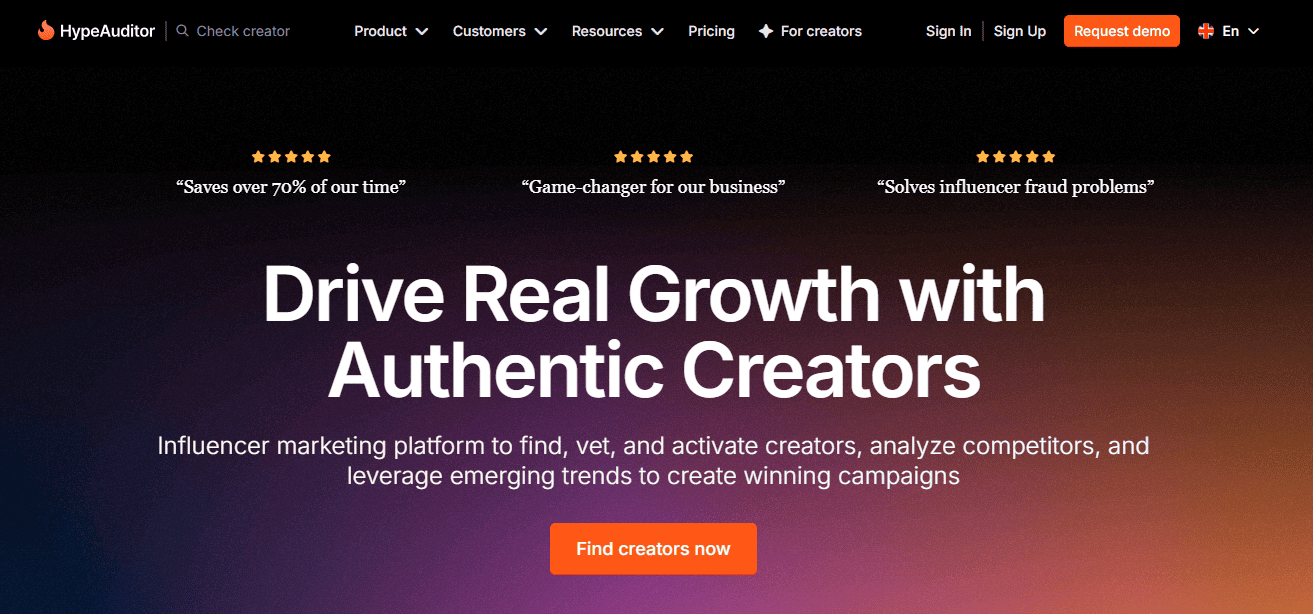
Platform Coverage: Instagram, TikTok, YouTube, Twitch, X (Twitter), Snapchat
Best For: HypeAuditor is best for brands and agencies that prioritize data accuracy, influencer authenticity, and fraud detection, making it a strong choice for companies that want to ensure transparency and credibility in influencer partnerships.
Pricing: Custom plans based on usage. Flexible contract terms depending on platform access, campaign volume, and number of reports.
Reviews: 4.5 / 5.0 (G2)
Ease of Use (UX/UI): HypeAuditor’s dashboard is designed to handle large datasets with detailed filtering and analytics. While powerful, it can feel complex for beginners, requiring onboarding or training to navigate all of its advanced search and reporting tools.
Customer Support: HypeAuditor provides onboarding assistance and ongoing customer support. Users note that the support team is responsive, though the depth of features often requires guided setup to maximize the platform’s full capabilities.
Social Book provides an affordable entry point at $199/month, covering influencer discovery, content tools, and campaign management for small to mid-sized brands. HypeAuditor, by contrast, is priced for larger organizations, starting at $10,000/year, and focuses on fraud detection, authenticity scoring, and deep audience insights.
While Social Book is easier to adopt and budget-friendly, HypeAuditor excels at ensuring campaign credibility and protecting ROI through its advanced fraud detection and authenticity scoring. For teams where accuracy and transparency outweigh cost, HypeAuditor is the stronger choice, whereas Social Book appeals to brands seeking broader tools at a lower price point.
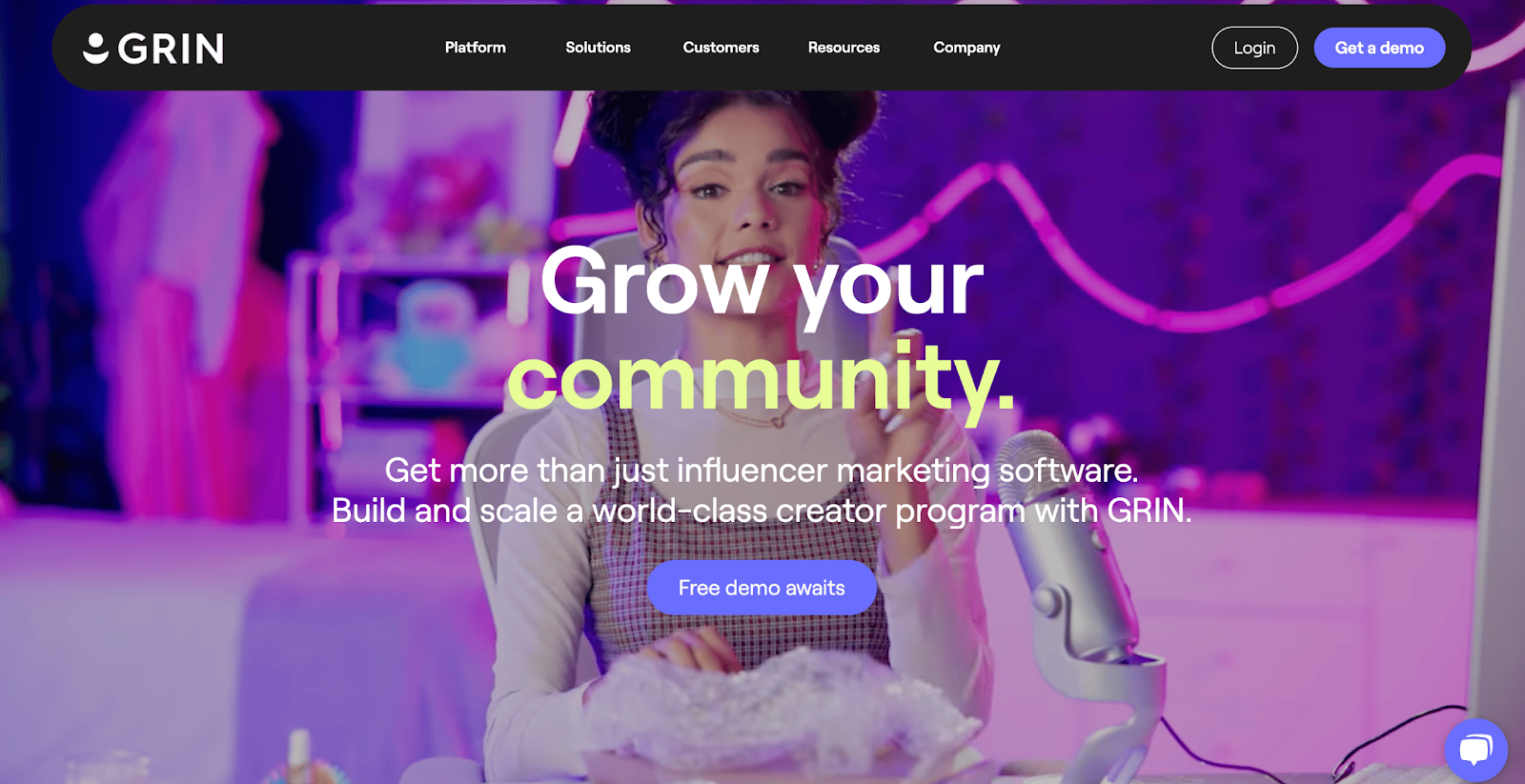
Platform Coverage: Instagram, TikTok, YouTube, X, Twitch, Snapchat
Best For: GRIN is best for DTC and eCommerce brands that want a purpose-built platform to manage end-to-end influencer programs within one unified ecosystem.
Pricing: Plans start at $25,000 per year, with monthly payments available and a required 12-month commitment; typical monthly costs range from $2,500 to over $10,000 depending on usage, though pricing transparency may vary based on selected features.
Reviews: 4.5 / 5.0 (G2)
Ease of Use (UX/UI): GRIN is designed with eCommerce workflows in mind, integrating natively with Shopify, WooCommerce, and Magento. While the platform centralizes everything in one dashboard, users have reported occasional performance issues and bugs that affect smooth navigation.
Customer Support: GRIN provides onboarding assistance and optional dedicated program strategists to help brands execute and optimize campaigns. While support is generally helpful, some users have noted delays in ticket resolutions and issues with follow-through on certain requests.
Check out our guide on the top 10 GRIN alternatives to find platforms that can elevate your influencer marketing strategy.
Social Book is an entry-level platform starting at $199/month, offering influencer discovery, campaign management, and content creation tools suited for small to mid-sized brands. GRIN, by contrast, is a premium platform designed for eCommerce-heavy businesses, with pricing starting at $25,000/year and built-in integrations for Shopify, WooCommerce, and Magento.
While Social Book provides affordability and accessibility, GRIN delivers deeper functionality for brands that need advanced eCommerce workflows, from automated gifting and discount codes to affiliate management and UGC rights.
The trade-off comes down to budget and complexity: Social Book works best for lean teams, while GRIN is tailored to established eCommerce players seeking end-to-end influencer marketing infrastructure.
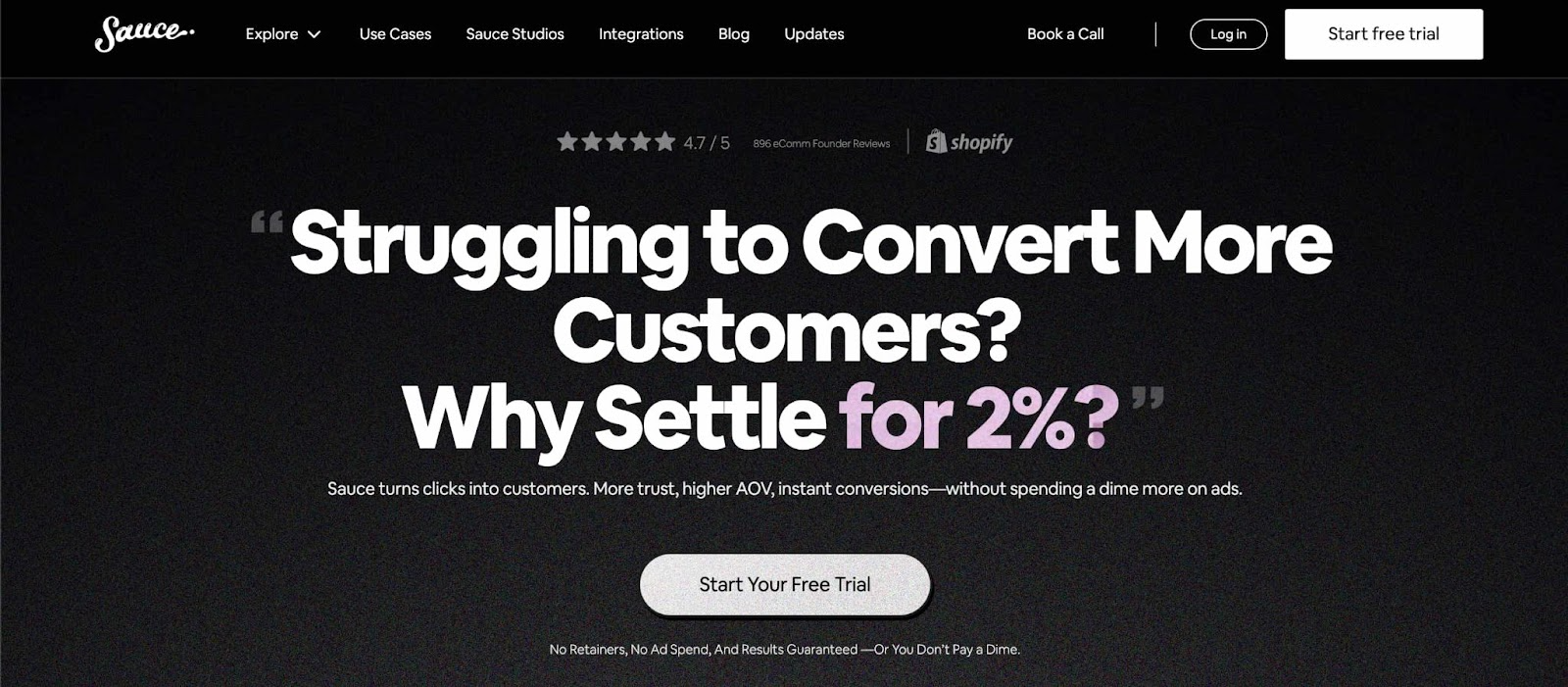
Platform Coverage: Integrates with Instagram and TikTok
Best For: AddSauce is best for eCommerce brands that want to transform influencer and UGC content into shoppable experiences, prioritizing social commerce, visual storytelling, and direct revenue attribution.
Pricing:
Free 7-day trial available on all plans.
Reviews: 4.6 / 5.0 (Shopify App Store)
Ease of Use (UX/UI): AddSauce is praised for its simple, zero-code setup that allows merchants to embed galleries and video content quickly. Its highly visual interface makes it intuitive for teams focused on conversion-driven campaigns.
Customer Support: Merchants highlight AddSauce’s responsive support, live chat, and onboarding guidance. The platform also offers a 7-day free trial, allowing users to test functionality before committing to a paid plan.
Social Book offers a traditional influencer marketing suite at $199/month, including discovery, campaign management, analytics, and content tools. AddSauce, meanwhile, positions itself as a social commerce platform with plans starting as low as $50/month, making influencer and UGC content shoppable across web, email, and mobile.
While Social Book appeals to brands looking for broader influencer campaign management, AddSauce excels for eCommerce brands that want to maximize conversions and average order value through visual, shoppable experiences. The decision comes down to priorities: Social Book provides classic influencer workflows, whereas AddSauce integrates influencer-driven content directly into the sales funnel.

Platform Coverage: Instagram, TikTok, YouTube, X , Twitch, Pinterest, WordPress blogs.
Best For: Upfluence is best for established eCommerce brands and agencies, especially those on Shopify or Amazon, looking for an all-in-one solution that covers influencer discovery, affiliate tracking, campaign management, and secure creator payouts.
Pricing: Upfluence offers annual contracts with the following pricing.
Reviews: 4.6 / 5.0 (G2)
Ease of Use (UX/UI): Upfluence provides a robust but more complex interface that can take time to master. While advanced users appreciate the detailed dashboards and multi-layered features, beginners often face a learning curve before fully leveraging its tools.
Customer Support: Upfluence offers dedicated onboarding and support to help brands set up campaigns and integrations. However, some users mention that support is tied closely to their long-term contracts, which may feel less flexible compared to month-to-month platforms.
Social Book is more affordable and flexible, starting at $199/month, making it attractive for small to mid-sized brands that need discovery, campaign management, and content tools. Upfluence, on the other hand, is an enterprise-grade platform with deep integrations into Shopify and Amazon, full campaign tracking, and end-to-end management, including secure payouts.
The key distinction lies in scale and pricing. While Social Book is easier to start with and more budget-friendly, Upfluence requires a steep $1,276/month annual contract but provides broader capabilities such as customer-influencer identification, social listening, and bulk payouts. For brands ready to invest heavily in ROI-driven influencer programs tied directly to eCommerce sales, Upfluence offers a more powerful solution.
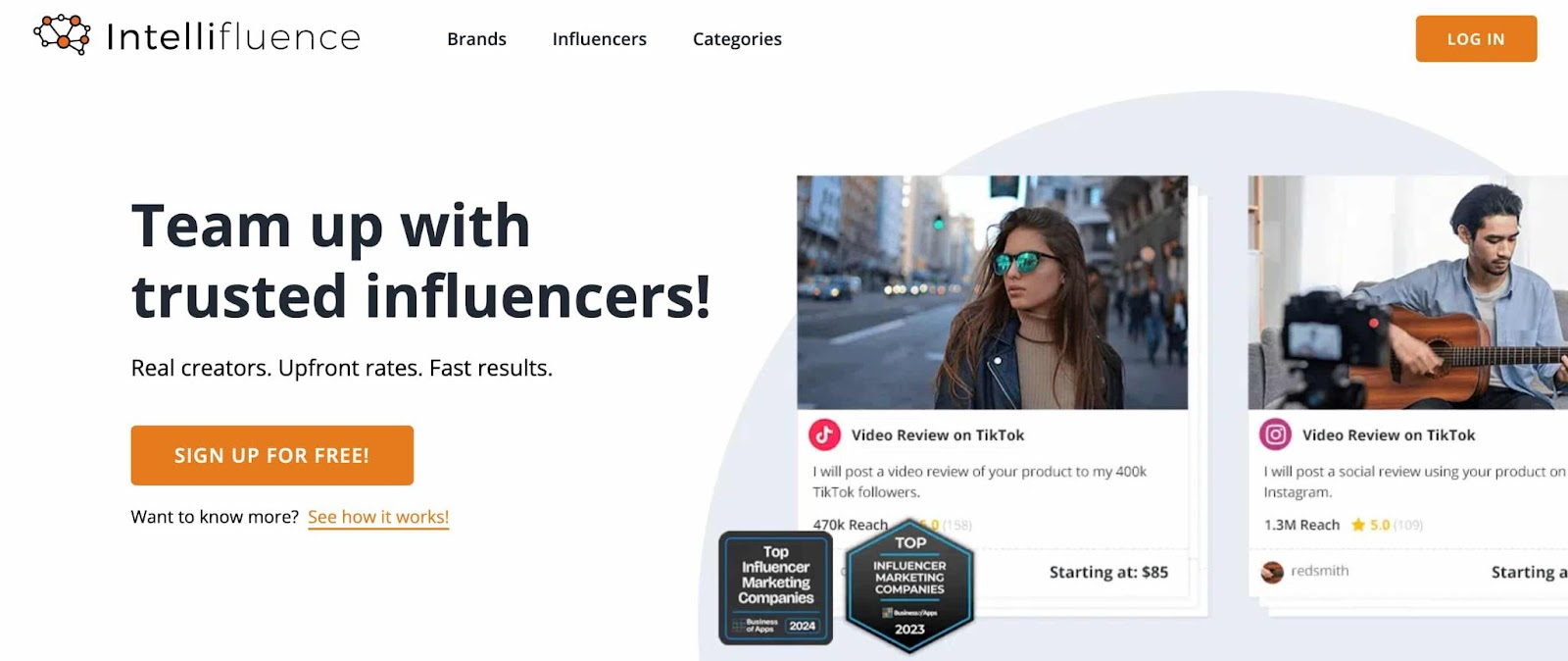
Platform Coverage: Intellifluence is a budget-friendly choice for small to mid-sized brands or marketers who want access to a large creator marketplace and campaign tools without committing to enterprise-level spend.
Best For: Intellifluence is best for small to medium-sized brands looking to collaborate with micro- and nano-influencers. It’s particularly useful for generating user reviews, building UGC campaigns, and experimenting with influencer partnerships on a limited budget.
Pricing:
Note: A 10% transaction fee applies to cash payments processed through the platform.
Reviews: 0.0 / 5.0 (G2)
Ease of Use (UX/UI): The platform is generally described as straightforward, with a clean dashboard and intuitive workflows. Some users, however, mention small glitches and that the mobile version doesn’t perform as smoothly as the desktop experience.
Customer Support: The support team is praised for being responsive and offering helpful tutorials and resources for new users. That said, campaign approvals and dispute resolutions can sometimes take longer than expected.
Social Book is priced at $199/month and provides an all-in-one suite for influencer discovery, campaign management, and content tools across Instagram, YouTube, and Twitch. Intellifluence, meanwhile, offers flexible entry pricing (including a free plan) and an opt-in marketplace focused on affordability and micro-influencer accessibility.
The trade-off comes down to functionality versus budget. Social Book offers more polished campaign management and analytics, while Intellifluence prioritizes low-cost access to influencers with fast, fixed-price collaborations. For brands looking for structured campaigns, Social Book is stronger; for those testing influencer partnerships at minimal cost, Intellifluence is the more flexible choice.

Platform Coverage: Shopify, Salesforce, Adobe Commerce, WooCommerce, HubSpot, Zapier, and other major marketing and eCommerce platforms.
Best For: TrueLoyal is best for brands seeking to strengthen authenticity and advocacy. It excels at turning customers and existing brand fans into long-term ambassadors, scaling UGC, and activating influencer content across digital touchpoints such as product pages, emails, and campaigns.
Pricing: Pricing is not publicly disclosed. TrueLoyal operates on a custom pricing model tailored to brand size and needs, with demos required for a detailed proposal.
Reviews: 4.8 / 5.0 (Capterra)
Ease of Use (UX/UI): Users appreciate the ability to centralize all influencer, creator, and customer content in one platform, making asset activation straightforward. Onboarding is often recommended to fully leverage its integrations and workflows.
Customer Support: Brands note that onboarding is demo-driven and includes strategic support. Some highlight access to strategist advice for identifying genuine brand advocates, making support feel consultative rather than transactional.
Discover our top 10 TrueLoyal (previously Tint) alternatives to explore the best options for streamlining your influencer campaigns
Social Book is a straightforward influencer marketing platform priced from $199/month, offering discovery, campaign management, and analytics for smaller brands and agencies. TrueLoyal, on the other hand, is designed for enterprises seeking authenticity and UGC activation, connecting influencer and customer advocacy into one central hub.
While Social Book is budget-friendly and accessible for small teams, TrueLoyal focuses on long-term advocacy and deeper eCommerce integrations with Shopify, Salesforce, and HubSpot. For brands prioritizing affordability and simple campaign tools, Social Book fits best; for those investing in authentic community-driven influence, TrueLoyal provides greater strategic value.
While Social Book provides basic tools for influencer discovery and campaign management, its limitations, like a clunky interface, inaccurate data, and inconsistent performance, have led many businesses to seek alternatives. Influencer Hero stands out as a top choice, offering an intuitive, all-in-one platform with AI-powered influencer discovery, advanced CRM, multi-platform support, and scalable solutions to track ROI and optimize partnerships.
Other alternatives, such as Modash, Grin, and Upfluence, offer specialized features like eCommerce integrations, advanced analytics, and affiliate tracking. Still, Influencer Hero’s comprehensive approach, automated outreach, real-time analytics, and integrated eCommerce support, makes it ideal for brands seeking reliability, scalability, and premium support to elevate their influencer marketing results.
Book a demo with Influencer Hero today to discover how it can simplify and scale your influencer campaigns!

Top alternatives include Influencer Hero, Modash, Grin, Upfluence, and CreatorIQ, offering advanced features like multi-platform support, enhanced analytics, and better customer support for managing influencer campaigns.
Influencer Hero provides a comprehensive suite of tools, including influencer discovery, automated outreach, real-time analytics, and multi-platform support, making it a more scalable and reliable solution than Social Book.
While Modash focuses on influencer discovery and eCommerce integrations, Influencer Hero offers a more complete solution with automated outreach, personalized campaign management, and better analytics.
Grin is designed for larger eCommerce businesses with deep integrations for Shopify and WooCommerce, offering end-to-end campaign management. Social Book is more suitable for smaller brands needing entry-level influencer tools.
Yes, Influencer Hero offers scalable pricing and features that work for small businesses, providing advanced influencer marketing tools without exceeding budget constraints.



Schedule a Demo with one of our media experts below.